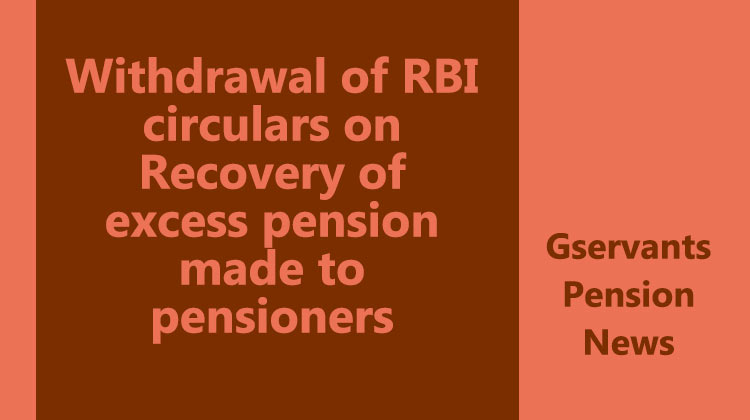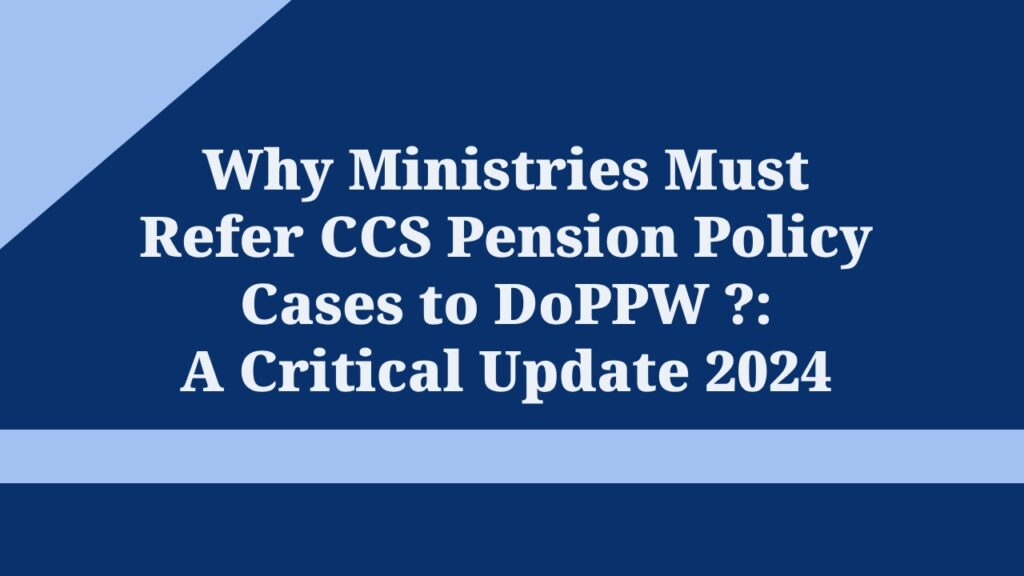Parity of Pension of Pre-2016 Pensioners with Post-2016 Pensioners – as per Recommendations of Seventh Pay Commission
RAILWAY SENIOR CITIZENS WELFARE SOCIETY
(Estd. 1991, Regd. No. 1881 – Under Registration of Societies Act),
Head Office: 32, Phase- 6, Mohali, Chandigarh -160055
Website http://rscws.com Email: [email protected]
Identified & Recognised by DOP&PW GOI under Pensioners Portal
No.RSCWS/ CHD/Memo/2016-9
Dated: 06-06-2016
Cabinet Secretary, Government of India &
CHAIRMAN, EMPOWERED COMMITTEE OF SECRETARIES ON 7TH CPC,
Cabinet Secretariat, Rashtrapati Bhawan, New Delhi – 110 004
CC to: [email protected]
Dear Sir,
Subject:- Parity of Pension of Pre-2016 Pensioners with Post-2016 Pensioners – as per Recommendations of Seventh Pay Commission. Reference: Para 10.1.67 of Seventh Pay Commission Report
1. We are deeply anguished and shocked to learn from the Secretary Staff Side, JCM, that you had indicated in the meeting with the representatives of JCM Staff Side on 26-5-2016, that the Departments of Pension and Defence were of the view that the first option recommended by the 7th CPC to bring about the parity with the past pensioners is unfeasible and impracticable – due to the non-availability of the requisite records.
2. Denial of Parity to Past Pensioners is going to cause a major financial loss to the Past Pensioners and would naturally agitate them seriously. The issue, therefore, needs reconsideration especially in view of the following points:
i) Service Records are protected documents and cannot be destroyed without specific orders of the competent authority.
ii) The views of the DOP&PW & Defence about the non-availability of the requisite records are too vague, unfounded and unjustified;
iii) Even if the Service Records of some of the Pensioners were not available, the same can be reconstructed/recast as per prescribed procedures and as per directions of various courts issued from time to time in such cases.
iv) All the Past Pensioners cannot be made to suffer heavy financial loss due to some missing records – which can in any way be reconstructed as stated above.
v) 5th & 6th Pay Commissions had recommended for grant of Modified Parity to past Pensioners. The orders were implemented on the basis of service records.
vi) Fifth CPC while evolving the norm of modified parity had mentioned in its Report that further improvements could be brought about by future Pay Commissions. It is after 20 years that 7th CPC taking a step in this direction recommended consideration of number of increments earned in that level while in service. The recommendation cannot be set aside on the plea of non-availability of record.
vii) Recommendations of the 7th CPC in Para 10.1.67 (option 1) for Parity of Pension of Past (Pre-2016) Pensioners were based on legal and Constitutional grounds and, as such, the same may please be implemented.
3. It is, therefore, requested that:
a) Recommendation of the Seventh CPC regarding option I for fixation of Pension of Pre-2016 Pensioners may please be implemented – keeping in view the above submissions.
b) Pay Matrix may please be modified so as to give equitable rise at all levels through same Index for fixation of Pay & Pension of Pre-2016 Pensioners.
c) Pension of Pre-2016 Pensioners who were senior and retired in higher Level of Posts may please be revised at par with the junior Post 2016 Pensioners who may get higher pension due to merger of Pay scales or having longer years of service in lower scale.
Yours truly,
(Harchandan Singh)
Secretary General,
RSCWS
Source: www.rscws.com Click here to view/download


I am a pensioner served the Railways in SENIOR ADMINISTRATIVE GRADE during Vth & VIth CPC regime and retired during VI th CPC in SAGrade itself.
While fixing the pay in VIth CPC for every TWO INCREMENTS EARNED BEFORE 1/1 2006, ONLY ONE INCREMENT WAS GIVEN EFFECT.In this process, I had lost FOUR increments.
The 7th CPC had considered various factors & stated that ”THE PENSIONERS SHOULD LIVE WITH DIGNITY” for the service rendered to the Govt and RECOMMENDED OPTION-1.
I therefore appeal one & all for implementation as RECOMMENDED BY 7th CPC.
continued email of 10.6.2016
the concerned department unless it has been destroyed in accordance with the rules framed by that Deptt/ Govt of India;
(e) In a recent land mark judgment in File No.CIC/DS/A/2013/001788SA (Sh.Om Prakash Vs. Land & Building Dept, GNCTD), the Hon’ble Prof. M. Sridhar Acharyulu (Madabhushi Sridhar) Information Commissioner has observed as follows with regard to the plea of the Respondent authority of record being not traceable,
“Unless proved that record was destroyed as per the prescribed rules of destruction/ retention policy, it is deemed that record continues to be held by public authority. Claim of file missing or not traceable has no legality as it is not recognized as exception by RTI Act. By practice ‘missing file ‘cannot be read into as exception in addition to exceptions prescribed by RTI Act. It amounts to breach of Public Records Act, 1993 and punishable with imprisonment up to a term of five years or with fine or both.”
Nona-availability of past records is no excuse to claim benefit of pre-2006 pensioners. One suggestions is to get an affidavit regarding number of increments earned by them without promotion and based on the affidavit fix pension under option -1. Get an undertaking for refunding, in case of any discrepancy from the pensioners due to excess payment of pension. Don’t forget the fact that the present employees are the future pensioners.
10.6.2016
From Ishwari Prasad Allahabad
Dear Pensioners,
A copy of my letter to PM, FM and Chairman empowered Committee is enclosed. Please add OR amend in our favour. This is in continuation of my earlier comments on 3.6.2016. I am not aware of any elected Pensioner Association in Allahabad.
With best wishes Ishwari, Allahabad
“The DOPPW stand against Pensioners, if true, violates the codal provisions framed by Govt of India, Parliament itself and needs investigation. Following provision needs to be gone through before accepting DOPPW’s recommendations which are against the rules
(a) Section 8(3) of RTI Act 2005, an Act Of Parliament having quasi judicial powers, provides , interalia, that “—any information relating to any occurrence, event or matter which has taken place, occurred or happened twenty years before the date on which any request is made under section 6 shall be provided to any person making a request under this section”. Service records cannot be destroyed at least for twenty years.
(b) Public Records Act 1993, which is almost identical with the definition of records under RTI Act 2005
(c) Section 3(2)(c)(ii) of the Destruction of Records Act 1917 laying down the periodicity of upkeep of records. The responsibility of proper upkeep of records lies with Heads of Department/ Heads of .Office;
(d) Departmental rules and orders regarding destruction of old record including obtaining NO OBJECTION certificates from all the wings, written orders of Head of Department for destruction of records, making cross entry in Record Register, and making entry/ certificate in Record Destruction Register under proper attestation of HOD/ HOO. The records of the government should continue to be available with the concerned department unless it has been destroyed in accordance with the rules framed by that Deptt/ Govt of India;
(e) In a recent land mark judgment in File No.CIC/DS/A/2013/001788SA (Sh.Om Prakash Vs. Land & Building Dept, GNCTD), the Hon’ble Prof. M. Sridhar Acharyulu (Madabhushi Sridhar) Information Commissioner has observed as follows with regard to the plea of the Respondent authority of record being not traceable,
“Unless proved that record was destroyed as per the prescribed rules of destruction/ retention policy, it is deemed that record continues to be held by public authority. Claim of file missing or not traceable has no legality as it is not recognized as exception by RTI Act. By practice ‘missing file ‘cannot be read into as exception in addition to exceptions prescribed by RTI Act. It amounts to breach of Public Records Act, 1993 and punishable with imprisonment up to a term of five years or with fine or both.”